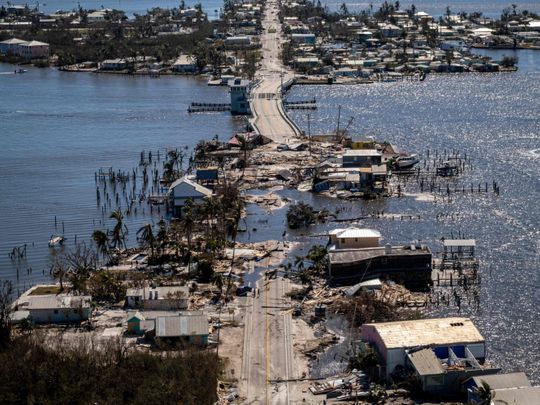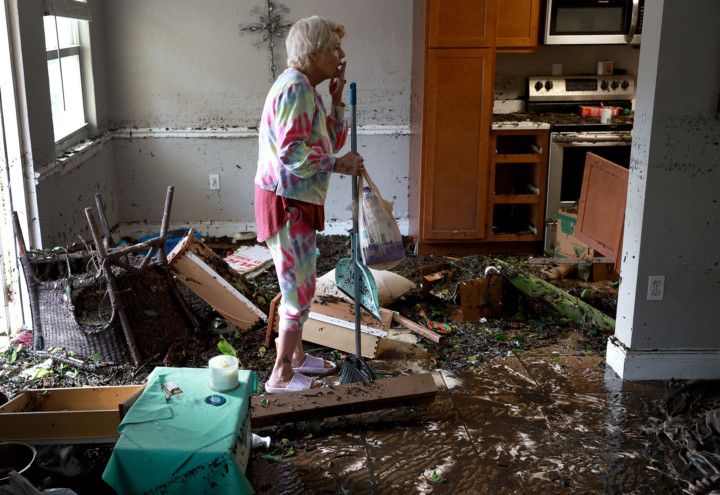
CHARLESTON, South Carolina: Rescuers searched for survivors among the ruins of Florida’s flooded homes from Hurricane Ian while authorities in South Carolina waited for daylight to assess damage from its strike there as the remnants of one of the strongest and costliest hurricanes to ever hit the US continued to push north.
The powerful storm terrorized millions of people for most of the week, battering western Cuba before raking across Florida from the warm waters of the Gulf of Mexico to the Atlantic Ocean, where it mustered enough strength for a final assault on South Carolina. Now weakened to a post-tropical cyclone, Ian was expected to move across central North Carolina on Saturday morning and reach south-central Virginia by the afternoon.
At least 30 people were confirmed dead, including 27 people in Florida mostly from drowning but others from the storm’s tragic aftereffects. An elderly couple died after their oxygen machines shut off when they lost power, authorities said.
Meanwhile, distraught residents waded through knee-high water Friday, salvaging what possessions they could from their flooded homes and loading them onto rafts and canoes.

“I want to sit in the corner and cry. I don’t know what else to do,’’ Stevie Scuderi said after shuffling through her mostly destroyed Fort Myers apartment, the mud in her kitchen clinging to her purple sandals.
In South Carolina, Ian’s centre came ashore near Georgetown, a small community along the Winyah Bay about 60 miles (95 kilometers) north of historic Charleston. The storm washed away parts of four piers along the coast, including two connected to the popular tourist town of Myrtle Beach.
The storm’s winds were much weaker Friday than during Ian’s landfall on Florida’s Gulf Coast earlier in the week. Authorities and volunteers there were still assessing the damage as shocked residents tried to make sense of what they just lived through.
Anthony Rivera, 25, said he had to climb through the window of his first floor apartment during the storm to carry his grandmother and girlfriend to the second floor. As they hurried to escape the rising water, the storm surge had washed a boat right up next to his apartment.
“That’s the scariest thing in the world because I can’t stop no boat,’’ he said. “I’m not Superman.’’
Even though Ian has long passed over Florida, new problems continued to arise. A 14-mile (22-kilometer) stretch of Interstate 75 was closed late Friday in both directions in the Port Charlotte area because of the massive mount of water swelling the Myakka River.
The official death toll climbed throughout the day on Friday, with authorities warning it would likely rise much higher once crews made a more comprehensive sweep of the damage. Searches were aimed at emergency rescues and initial assessments, Florida Division of Emergency Management Director Kevin Guthrie said. He described one submerged home as an example.
“The water was up over the rooftop, right, but we had a Coast Guard rescue swimmer swim down into it and he could identify that it appeared to be human remains. We do not know exactly how many,’’ Guthrie said.
The dead included a 68-year-old woman swept into the ocean by a wave and a 67-year-old man who who fell into rising water inside his home while awaiting rescue.
Authorities also said a 22-year-old woman died after an ATV rollover from a road washout and a 71-year-old man suffered a fatal fall from a rooftop while putting up rain shutters. Another three people died in Cuba earlier in the week.
Hurricane Ian has likely caused “well over $100 billion’’ in damage, including $63 billion in privately insured losses, according to the disaster modeling firm Karen Clark & Co., which regularly issues flash catastrophe estimates. If those numbers are borne out, that would make Ian at least the fourth costliest hurricane in US history.
In the Sarasota suburb of North Point, Florida, residents of the Country Club Ridge subdivision waded through waterlogged streets Friday. John Chihil solemnly towed a canoe and another small boat through the ankle-deep water.
“There’s really not much to feel. It’s an act of God, you know?’’ he said. “I mean, that’s all you can do is pray and hope for a better day tomorrow.’’






